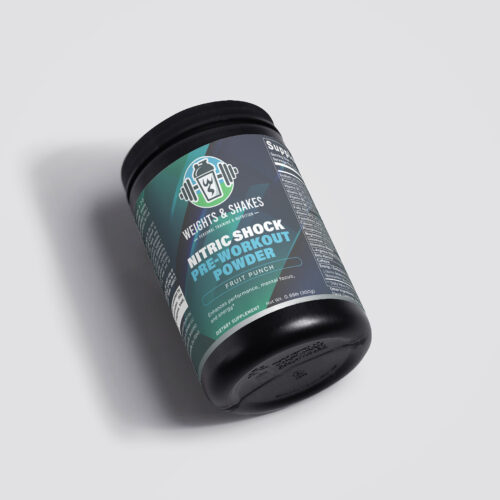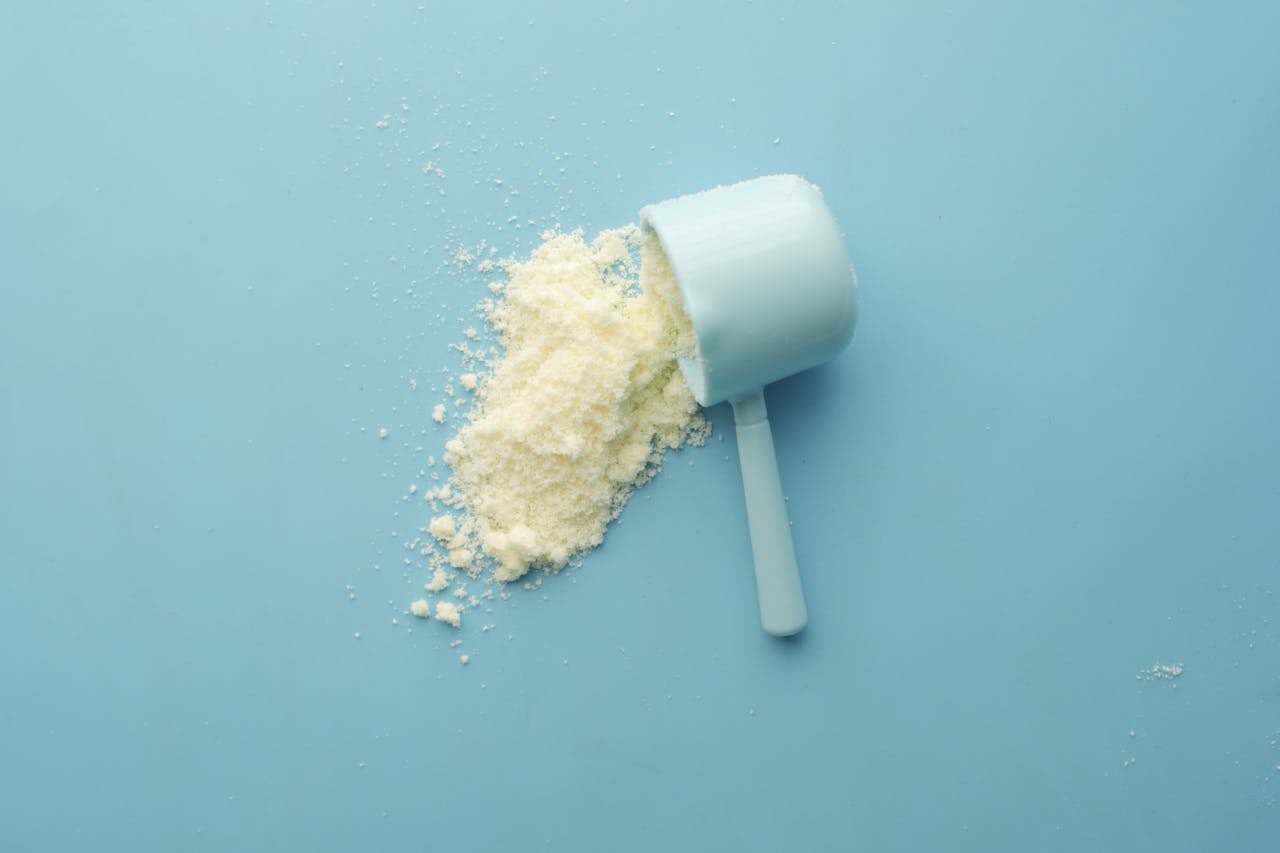Sign Up for Newsletter
 When it comes to optimizing performance, athletes leave no stone unturned—training programs, nutrition, and recovery protocols are carefully planned to ensure peak performance. One of the most effective yet often misunderstood components of athletic supplementation is pre-workout supplementation.
When it comes to optimizing performance, athletes leave no stone unturned—training programs, nutrition, and recovery protocols are carefully planned to ensure peak performance. One of the most effective yet often misunderstood components of athletic supplementation is pre-workout supplementation.
Pre-workouts are designed to enhance energy, improve focus, and increase endurance, helping athletes push their limits while reducing perceived exertion. But not all pre-workouts are created equal. Some formulas overload caffeine, causing jitteriness, while others lack essential performance-enhancing ingredients.
Weights & Shakes formulated Nitric Shock Pre-Workout to strike the perfect balance—delivering a scientifically backed dose of key nutrients and caffeine to energize you without making you feel overly wired. In this article, we’ll dive deep into how pre-workout works, its benefits and drawbacks, the science behind key ingredients, and why Weights & Shakes Nitric Shock Pre-Workout stands above the rest.
How Pre-Workout Enhances Athletic Performance
Pre-workouts typically contain a blend of caffeine, amino acids, nitric oxide boosters, and endurance-enhancing compounds. The combination of these ingredients can help athletes in several ways:
- Increased Energy & Focus: Caffeine and nootropic ingredients improve mental clarity, reaction time, and alertness.
- Enhanced Blood Flow & Oxygen Delivery: Nitric oxide boosters like L-arginine and citrulline malate increase vasodilation, improving oxygen and nutrient transport to working muscles (Bailey et al., 2012).
- Reduced Fatigue & Improved Endurance: Beta-alanine buffers lactic acid buildup, delaying muscle fatigue and increasing exercise duration (Hobson et al., 2012).
- Increased Strength & Power Output: Creatine and branched-chain amino acids (BCAAs) support ATP production and muscle recovery, enhancing strength performance.
Why Pre-Workout Timing Matters
To maximize the effectiveness of pre-workout supplements, timing is key. Research suggests that consuming pre-workout 30-45 minutes before training allows optimal absorption of caffeine, nitric oxide boosters, and other active ingredients (Spradley et al., 2012).
Recommended Usage & Frequency
- Athletes in high-intensity training: Pre-workout can be taken daily, but it’s recommended to cycle off every 6-8 weeks to prevent caffeine desensitization.
- Casual gym-goers: Using pre-workout 3-4 times per week on high-intensity days is ideal.
- Endurance athletes: Depending on caffeine sensitivity, pre-workout can be taken before long training sessions or competitions.
The Pros & Cons of Pre-Workout Supplementation
 Pros
Pros
✔ Boosts energy and mental focus for more effective workouts.
✔ Increases endurance by reducing perceived exertion.
✔ Improves strength and power output, especially with creatine-based formulas.
✔ Enhances muscle pumps and nutrient delivery through nitric oxide boosters.
Cons
❌ Caffeine sensitivity: Some individuals may experience jitters or sleep disturbances if consumed too late in the day.
❌ Dependency risk: Regular use of high-caffeine formulas can lead to tolerance buildup.
❌ Artificial additives in low-quality formulas: Many pre-workouts use unnecessary fillers or excessive stimulants.
Weights & Shakes Nitric Shock Pre-Workout Stands Above the Rest!
 Unlike many pre-workouts that overload stimulants, Weights & Shakes Nitric Shock Pre-Workout is scientifically formulated to deliver the perfect amount of energy, endurance, and focus—without the crash.
Unlike many pre-workouts that overload stimulants, Weights & Shakes Nitric Shock Pre-Workout is scientifically formulated to deliver the perfect amount of energy, endurance, and focus—without the crash.
Key Features of Nitric Shock Pre-Workout
- Moderate caffeine dosage (200mg per serving) – Enough to increase alertness and stamina without overstimulating.
- Citrulline Malate & L-Arginine – Enhances nitric oxide production for better endurance and pumps.
- Beta-Alanine – Scientifically proven to delay muscle fatigue and improve performance (Trexler et al., 2015).
- Creatine & BCAAs – Supports strength, recovery, and muscle protein synthesis.
The Science Behind Caffeine & Performance
Caffeine is one of the most widely studied performance-enhancing compounds. A meta-analysis of 21 studies found that caffeine improves strength, endurance, and reaction time, making it ideal for both resistance and endurance training (Grgic et al., 2019). However, excessive caffeine intake can cause jitters, crashes, and dehydration—which is why Weights & Shakes formulates Nitric Shock Pre-Workout with just the right amount to maximize benefits without the downsides.
Is Pre-Workout Worth It?
For athletes serious about performance, focus, and endurance, pre-workout supplementation can be a game-changer. The right formula enhances energy, improves blood flow, and delays muscle fatigue—all critical factors for peak performance.
But not all pre-workouts are created equal. Weights & Shakes Nitric Shock Pre-Workout is designed to deliver maximum benefits with no compromises, giving you all the energy and performance support you need—without the jitters or crash.
If you’re looking for a clean, effective, and research-backed pre-workout to fuel your training sessions, try Weights & Shakes Nitric Shock Pre-Workout today.
➡ Shop now: Nitric Shock Pre-Workout
References
- Bailey, S. J., Winyard, P., Vanhatalo, A., Blackwell, J. R., DiMenna, F. J., Wilkerson, D. P., & Jones, A. M. (2012). Acute L-arginine supplementation reduces the O2 cost of moderate-intensity exercise and enhances high-intensity exercise tolerance. Journal of Applied Physiology, 113(4), 725-736.
- Hobson, R. M., Saunders, B., Ball, G., Harris, R. C., & Sale, C. (2012). Effects of β-alanine supplementation on exercise performance: A meta-analysis. Amino Acids, 43, 25-37.
- Spradley, B. D., Crowley, K. R., Tai, C. Y., Kendall, K. L., Fukuda, D. H., & Esposito, P. E. (2012). Ingesting a preworkout supplement containing caffeine, creatine, and amino acids before exercise can enhance resistance training performance. Journal of Strength and Conditioning Research, 26(7), 1928-1935.
- Trexler, E. T., Smith-Ryan, A. E., Stout, J. R., Hoffman, J. R., Wilborn, C. D., Sale, C., & Kreider, R. B. (2015). International Society of Sports Nutrition position stand: Beta-Alanine. Journal of the International Society of Sports Nutrition, 12(1), 30.
- Grgic, J., Trexler, E. T., Lazinica, B., & Pedisic, Z. (2019). Effects of caffeine intake on muscle strength and power: A systematic review and meta-analysis. Journal of the International Society of Sports Nutrition, 16(1), 14.






